Related Research Articles
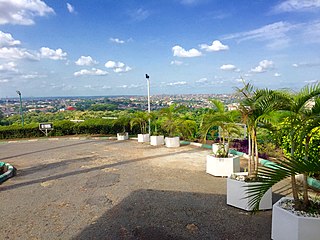
Ibadan is the capital and most populous city of Oyo State, in Nigeria. It is the third-largest city by population in Nigeria after Lagos and Kano, with a total population of 3,649,000 as of 2021, and over 6 million people within its metropolitan area. It is the country's largest city by geographical area. At the time of Nigeria's independence in 1960, Ibadan was the largest and most populous city in the country, and the second most populous in Africa behind Cairo. Ibadan is the second fastest growing city in Africa according to the UN(2022) And is the third in west Africa in tech startups index.

Oyo State is an inland state in southwestern Nigeria. Its capital is Ibadan, the third most populous city in the country and formerly the second most populous city in Africa. Oyo State is bordered to the north by Kwara State, to the east by Osun State, and to the southwest by Ogun State and the Republic of Benin. With a projected population of 7,840,864 in 2016, Oyo State is the fifth most populous in the Nigeria.
The National Council of Nigeria and the Cameroons (NCNC) later changed to the National Convention of Nigerian Citizens, was a Nigerian nationalist political party from 1944 to 1966, during the period leading up to independence and immediately following independence.

Obafemi Awolowo University (OAU) is a federal government-owned university that is located in the ancient city of Ile-Ife, Osun State, Nigeria. The university was founded in 1961 and classes commenced in October 1962 as the "University of Ife" by the regional government of Western Nigeria, which was led by Samuel Ladoke Akintola, and was renamed "Obafemi Awolowo University" on 12 May 1987 in honour of Obafemi Awolowo (1909–1987), the first premier of the Western Region of Nigeria, whose idea the university was.

The Nigeria Professional Football League (NPFL) is the highest level of the Nigerian football league system, for the Nigerian club-football championships. The Nigerian league has suffered, like many others, from the financial impact and dwindling fortunes since the late 2000s. It is fed into by the Nigeria National League (NNL). It is organised by the League Management Company (LMC).
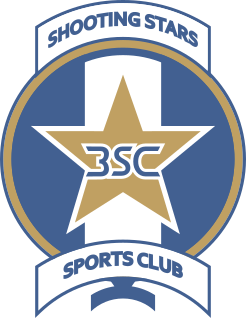
Shooting Stars Sports Club is a Nigerian football club based in Ibadan.
Chief Samuel Ládòkè Akíntọ́lá, otherwise known as S.L.A., was a Nigerian politician, lawyer, aristocrat and orator who was born in Ogbomosho, of the then Western Region. In addition to serving as one of the founding fathers of modern Nigeria, he was also elevated to the position of Oloye Aare Ona Kakanfo XIII of the Yoruba.
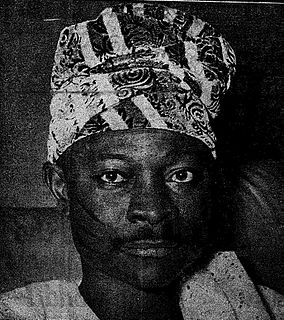
Gbadamosi Adegoke Adelabu was a prominent personality in the politics of Ibadan city and subsequently that of the Western Region of Nigeria right before the country's independence in 1960. He was Nigeria's Minister of Natural Resources and Social Services from January 1955 to January 1956 and was later the opposition leader in the Western Regional Assembly until his death in 1958. He was a self-made man born into a humble family but became an influential figure in Nigerian politics. He attended Government College, Ibadan and eventually became a businessman. His successful political career was cut short when he was killed in a car crash, not long before Nigeria gained independence from Britain.
The Ibadan Peoples Party (IPP) was established on June 15, 1951, by a group of eminent Ibadan indigenes who opposed the policies which held sway in the Yorùbá dominated Western Region, Nigeria in the 1950s. Its founding chairman was Chief Augustus Akinloye, and the other founders were; Chief Adegoke Adelabu, Chief Kola Balogun, Chief T. O. S. Benson, Chief Adeniran Ogunsanya and Chief H. O. Davies. The other leaders of the IPP were: Chief S. A. Akinyemi, Chief S. O. Lanlehin, Chief Moyo Aboderin, Chief Samuel Lana, Chief D. T. Akinbiyi, Chief S. Ajunwon, Chief S. Aderonmu, Chief R. S. Baoku, Chief Akin Allen and Chief Akinniyi Olunloyo.
The Action Group (AG) was a Nigerian nationalist political party established in Ibadan on 21st March 1951, by Chief Obafemi Awolowo. The party was founded to serve as the platform for realizing his preliminary objective of mobilizing Western Nigerians to forestall the NCNC control of the Western Region and the subsequent aim of cooperating with other nationalist parties to win independence for Nigeria. It benefited immensely from the relationships developed in the Egbe Omo Oduduwa formed in Awolowo's days in London as a student.

The First Republic was the republican government of Nigeria between 1963 and 1966 governed by the first republican constitution. The country's government was based on a federal form of the Westminster system. The period between October 1, 1960, when the country gained its independence and January 15, 1966, when the first military coup d’état took place, is also generally referred to as the First Republic. The first Republic of Nigeria was ruled by different leaders representing their regions as premiers in a federation during this period. Leaders include Ahmadu Bello Northern Nigeria 1959 – 1966, Obafemi Awolowo Western Nigeria 1959 – 1960, Samuel Akintola Western Nigeria 1960 – 1966, Michael Okpara Eastern Nigeria 1960 – 1966, and Dennis Osadebay Mid-Western Nigeria 1964 – 1966.
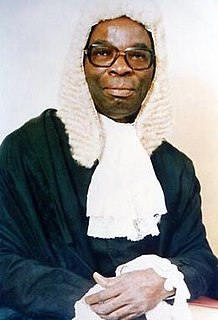
Babatunji Olowofoyeku, OFR, SAN, was a Nigerian politician, educationist, lawyer and leader, a Yoruba and native of Ilesha in Osun State of Nigeria, whose political career started in the mid-1950s.
The Kano riot of 1953 refers to the riot, which broke out in the ancient city of Kano, located in Northern Nigeria, in May 1953. The nature of the riot were clashes between Northerners who were opposed to Nigeria's Independence and Southerners made up of mainly the Yorubas and the Igbos who supported immediate independence for Nigeria. The riot that lasted for four days claimed many lives of the Southerners and Northerners and many others were wounded.
Busari Adelakun was a Nigerian politician from Ejioku area of Ibadan, Oyo State. He was affiliated with the Action Group and Unity Party of Nigeria (UPN) during the First and Second Republic respectively. As a member of UPN and a later NPN in Ibadan during the second republic, Adelakun was an important figure in the turbulent politics of the city.
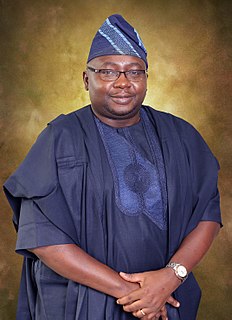
Adebayo Adelabu is a former deputy governor, operations of the Central Bank of Nigeria and 2019 Oyo State gubernatorial candidate for the All Progressives Congress.

Alhaji Oloye Dauda Soroye Adegbenro (1909-1975) was a Nigerian politician, a national leader of the Action Group (AG) Party and Minister of Land and Labour. He was revered by his people in Abeokuta, who conferred on him the chieftaincy titles of Balogun of Owu Egba and Ekerin of Egbaland.
Samuel Adesina Gbadebo, otherwise known as Gbadebo II, was a Nigerian traditional monarch who held the title of Alake of Egbaland. Prior to becoming Alake, Gbadebo organized agricultural shows in the Western region of Nigeria.
Abdul Ganiyu Agbaje is a Nigerian retired judge who served as a justice of the Nigeria Supreme Court.
Taiwo Joseph Ogunjobi was a Nigerian football player and administrator. He played as a centre-back for Shooting Stars and represented Nigeria internationally. He later held posts as an administrator at club and state levels, and with the Nigeria Football Federation (NFF) and its predecessor the Nigeria Football Association, serving as secretary-general between 2002 and 2005.
Pa Joseph Ladipo was a Nigerian footballer and manager.
References
- ↑ Adejumo, Wole (October 18, 2016). "Izu Joseph … Our Izu, a Star Has Been Dimmed". theanchoronline.
- ↑ Adesokan, Akin. "Ibadan, Soutin and the Puzzle of Bower's Towe" (PDF). African Cities Reader 1. Cape Town: African Centre for Cities and Chimurenga Magazine.
- ↑ Sanni 2005, p. 6.
- ↑ Sanni 2005, p. 7.
- ↑ Sanni 2005, p. 13.
- ↑ Adesina, Lam (March 9, 2003). "Obasanjo's Camp Infiltrated By Fake Supporters- Lam Adesina" (Interview). Interviewed by Wale Akinola & Sina Babasola. Lagos: Vanguard.
- ↑ Sanni 2005, p. 25.
- ↑ Sanni 2005, p. 27.
- ↑ Sanni 2005, p. 34.
- ↑ Sanni 2005, p. 51.